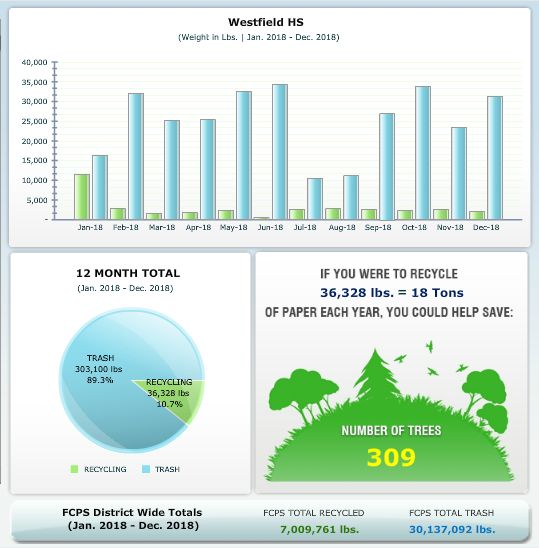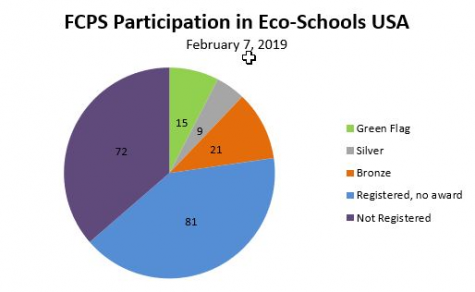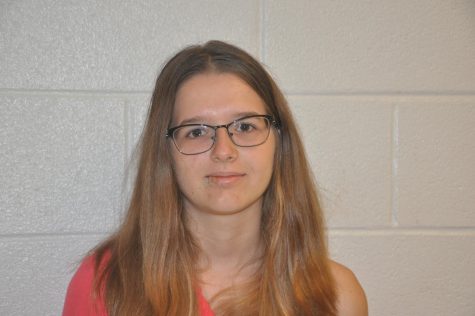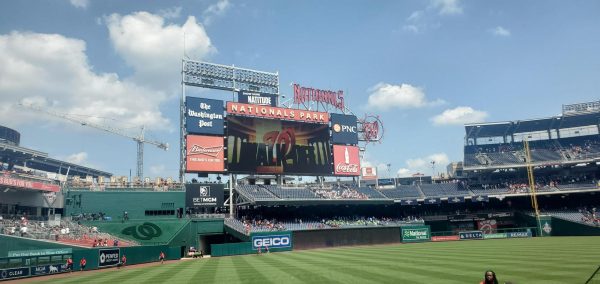WESTFIELD: RECYCLING AT LAST?

Photo courtesy of Get2Green
A diagram portraying Westfield’s recycling for 2018
Since the initiation of the Get2Green plan in Fairfax County Public Schools (FCPS) ten years ago, Westfield has made minimal efforts to follow the policy. According to numbers provided by Get2Green, the award-winning environmental stewardship program for FCPS, Westfield has been one of the worst in the county about both recycling and energy consumption. But all of this is about to change.
It is not news to anyone that the world is facing the effects of climate change. In September, Hurricane Dorian completely wiped out the Bahamas and severely damaged the East Coast of the US. Many laughed at President Trump’s remark: “I am not even sure I’ve ever heard of a category five. I knew it existed.” However, there were five category five hurricanes during his time in office. It is not as funny as it is alarming. These extremely strong hurricanes have been forming because of the unusually warm water, which has given the storms higher energy, explains The New York Times.
Climate change is happening. Yes, scientists are unsure of the extent to which humans actually affect it, but should it really stop FCPS from doing everything possible to prevent it? According to the National Aeronautics and Space Administration (NASA), the occurrence of more vicious storms, extinction of wildlife, heat waves, fires, rising sea levels, and melting of polar ice caps are all effects of climate change. The Get2Green plan is one way that FCPS is using stop it.
FCPS is the tenth largest school division in the US, which puts it in a position of power and influence. The same way that US leads the world, FCPS is one of the counties that others view as a role model. Westfield, with the united forces of students and staff, could set a domino effect: knock down Westfield and a chain reaction will follow.
Westfield is one of 81 schools in FCPS that has been registered as an Eco-School, but so far has received no awards. However, the school now has an opportunity to change.
Blue. That is the dominant color in the storeroom next to the environmental science classroom. Blue bins, boxes, and containers of all shapes are stacked up like towers, waiting for the time when someone picks them apart piece by piece and spreads them around. Blue is the color of clean oceans, bright and nonchalant sky, and, of course, recycling.
Thanks to the environmental club, under the guidance of Deborah LeGros, science teacher, Westfield has received $8,000 worth of recycling equipment, including 94 bins of four different sizes, two tilt trucks, and 16 dollies.
As of right now, the content of Westfield’s recyclable bins ends up in the same place as the trash. The problem is that custodians don’t have a separate container for recyclable materials.
LeGros conjectured, “I think the school didn’t want to buy the equipment.”
Charles Gibbs, social studies teacher, presented the school’s point of view: “The name of the game in policy is that there usually must be sufficient urgency for a problem to be addressed that there would be strict oversight of that policy’s implementation by those who are responsible. In other words, when you take into account the central mission of a school—that is, to educate students and provide them with opportunities for social development, recycling would typically rate at the lower end of the list of priorities. This is further illustrated when you take a close look at the budgets for many local governing bodies. When local budgets get tight, what are among the first items to be cut? You guessed it, recycling programs, along with the arts, of course. That said, there is certainly cause to demand improvement.”
However, a lot of people would argue that there is urgency. There have already been millions of climate change refugees and people all around the world are going on frequent strikes. On September 18, Greta Thunberg and other young climate change activists, all under the age of 22, have come before the Congress and demanded urgent action.
Representative Garret Graves of Louisiana made a point about China’s increased emissions making any US attempts futile, and then asked Thunberg, “If you are sailing across the ocean and you are picking up trash along the way and for every one piece of trash that you pick up, there is a boat right next to you dumping out five pieces. How would it make you feel?”
Thunberg countered, “I am from Sweden. It is a small country, and there it is the same argument: why should we do anything, just look at the U.S.”

A pie chart showing the number of schools which received awards for their recycling programs.
So how can Westfield recycle more to offset this effect?
LeGros has a solution: change the culture: “I think it’s just because the school is so big, and there are so many people, and it’s not part of the culture. And that’s what we are trying to do with this stuff here, is we are trying to change the culture of the school. I mean, kids care about it, you know, like kids right now that are in school care about it more than they did ten years ago. Nobody cared about it back then. And so we’ve just gotten kind of complacent. It’s laziness, you know, it’s easy not to do anything. But if we make it easy to do it, then they will.”
Elementary schools recycle more than middle schools and middle schools recycle more than high schools. The notion that older people should lead by example has been forgotten.
But now Westfield has the equipment and a solution. All that is left is the people willing to change. And once Westfield makes recycling a habit, LeGros plans to tackle energy consumption, but the school has to start small.
“One step at a time. People are stupid,” said LeGros jokingly, “And so you know, you can only give them one thing at a time. And once they’re good at that, then give them something else.”
That something else would be energy saving. The environmental club has around 40 members from all grade levels. A big number, but they could always use some help.
Plus, “club members will get service hours for all of the work they do,” announced LeGros.
But it’s not only the students creating change: “Our head custodian, Rosa Cruz, was very familiar with recycling at her previous school, and she was very excited to get on board with us. She took it upon herself to call the FCPS Grounds department and requested recycling bins for the stadium. She got six recycling containers donated in time for the Westfield Homecoming game!” cheered LeGros.
According to United Nations (UN) predictions, by 2025 there might be 275 million tons of mismanaged waste. This is a lot of greenhouse gases to make global warming worse. LeGros believes that Westfield can help reduce that number by properly recycling.




